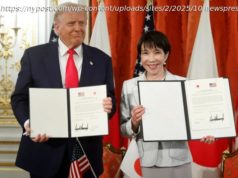Why should an innovative company pay cash for a fading business?
Fujifilm Holdings Corp. should see the big picture. The Japanese company may have lost face in being beaten by activists, but the collapse of its $6.1 billion takeover of Xerox Corp. is a relief. Management can now go back to focusing on growth, rather than fighting the likes of Carl Icahn and Darwin Deason.
The attempt to double down on the copier and printing business would have given Fujifilm 50.1 percent of a company that holds both Xerox and a lucrative Asian joint venture of the two parties. This regional affiliation is crucial, but it was already under the Japanese firm’s control before the takeover bid. Fujifilm owns 75 percent of the venture, which accounted for 44 percent of its sales in calendar 2017, according to Bloomberg Intelligence analyst Simon Chan.
The deal would have been fine for Fuji as a stock swap with no further cash outlay. As I wrote before, control of Xerox would have given the Japanese company direct access to distribution channels in North America and Europe, beyond its Asian connections through the joint venture. Potential cost savings could have reached $1.2 billion, Fujifilm had said. And even with an expectation for further declines in Xerox sales, the storied company remains a cash-generating business, with about $1.3 billion on hand as of Dec. 31.
But the minute a New York judge sided with Deacon, agreeing that Xerox CEO Jeff Jacobson had engineered the deal to save his job, the Japanese firm was smart to stay away from bidding up. Managing Xerox and buying out the Asian venture in a no-cash deal would be one thing; paying money to expand in a business in which Fujifilm itself is posting lower sales is a different matter.
Besides, laying off 10,000 people in Asia, especially in Japan, would have been a political nightmare for Fujifilm, which has only just moved on from an accounting scandal in the Asian joint venture’s Australia and New Zealand operations.
Fujifilm, once famed for its analog film business, reinvented itself by moving into health care and even cosmetics. Its pursuit of Xerox contrasts with Takeda Pharmaceutical Co.’s ultimately successful courtship of Shire Plc, a high-growth drugmaker, even after being spurned four times: That deal made sense. This one, if there’s cash on the table, doesn’t.
Fujifilm may risk a withdrawal by Xerox from the Asian venture, but the cash-rich company would have no trouble buying out its partner.
The Japanese firm has successfully navigated a shift to the digital age, unlike its former arch-rival, Eastman Kodak Co. It should now stay the reinvention course.
To contact the author of this story: Nisha Gopalan at ngopalan3@bloomberg.net
To contact the editor responsible for this story: Paul Sillitoe at psillitoe@bloomberg.net






